College mascots are meant to represent their school, often putting off a much-feared and intimidating appearance. But some mascots fall on the other end of the spectrum and tend to attract more ridicule than fear. Others are so amazingly offensive that we can’t help but chuckle about their mere existence. Whatever the case, these mascots have all been retired, for better or for worse.
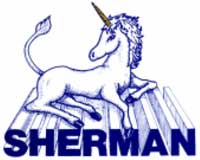 The Sherman College Unicorn was chosen early in the college’s history, and was meant to represent “purity, strength, and fierceness against evil.” Unfortunately for Sherman College, most people just imagine unicorns in the Lisa Frank sense, animals that no one thinks are “fierce” except maybe Tyra Banks. Students grew indifferent to the unicorn, and “found it difficult to use as a mascot for the increasing number of Sherman community athletic teams.” We think that’s pres-release speak for “the soccer team was embarrassed.” In 2007, the college set out to find a new mascot to replace the unicorn, eventually settling on an incredibly generic lion, which is not at all exciting, but is at least innocuous enough not to attract taunting from other teams. Other top choices were “Whistle Pig,” “Raptor,” “Bear,” and “Wolfpack.” Personally, we would have liked to see the Raptors, but at least now Sherman has the opportunity to bring a live mascot to games, considering lions actually do exist.
The Sherman College Unicorn was chosen early in the college’s history, and was meant to represent “purity, strength, and fierceness against evil.” Unfortunately for Sherman College, most people just imagine unicorns in the Lisa Frank sense, animals that no one thinks are “fierce” except maybe Tyra Banks. Students grew indifferent to the unicorn, and “found it difficult to use as a mascot for the increasing number of Sherman community athletic teams.” We think that’s pres-release speak for “the soccer team was embarrassed.” In 2007, the college set out to find a new mascot to replace the unicorn, eventually settling on an incredibly generic lion, which is not at all exciting, but is at least innocuous enough not to attract taunting from other teams. Other top choices were “Whistle Pig,” “Raptor,” “Bear,” and “Wolfpack.” Personally, we would have liked to see the Raptors, but at least now Sherman has the opportunity to bring a live mascot to games, considering lions actually do exist.
2. Elon College Fighting Christian
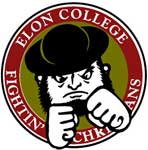 Back in 1889, Elon College was founded by the Christian Church (now a part of the United Church of Christ), and was at the time a training ground for young ministers, where college trustees were elected by the church and professors were church members. This church school was apparently quite vicious in athletics, and the Fighting Christian mascot was adopted in the 1930s, coined by a sportswriter. But it’s not at all hard to understand why Elon chose to lose the “Fighting Christian” when it became Elon University in 2000, as the college had grown out of its restrictive church bounds and included many students from religious minorities. The university community questioned the “appropriateness of having such a religious school mascot,” particularly Jewish students involved in athletics. So in the transition to becoming Elon University, the school adopted the phoenix mascot, meant to be a nod to the school “rising from the ashes” after a devastating 1923 fire, and transforming the school’s image to one that “really welcomes people from all over.” Not everyone has been happy with the change, and some critics have called out Elon officials for “caving to political correctness” and depriving students of “seeing a pugnacious parson with a pilgrim beard squaring off with [opponents].”
Back in 1889, Elon College was founded by the Christian Church (now a part of the United Church of Christ), and was at the time a training ground for young ministers, where college trustees were elected by the church and professors were church members. This church school was apparently quite vicious in athletics, and the Fighting Christian mascot was adopted in the 1930s, coined by a sportswriter. But it’s not at all hard to understand why Elon chose to lose the “Fighting Christian” when it became Elon University in 2000, as the college had grown out of its restrictive church bounds and included many students from religious minorities. The university community questioned the “appropriateness of having such a religious school mascot,” particularly Jewish students involved in athletics. So in the transition to becoming Elon University, the school adopted the phoenix mascot, meant to be a nod to the school “rising from the ashes” after a devastating 1923 fire, and transforming the school’s image to one that “really welcomes people from all over.” Not everyone has been happy with the change, and some critics have called out Elon officials for “caving to political correctness” and depriving students of “seeing a pugnacious parson with a pilgrim beard squaring off with [opponents].”
3. Bomberman
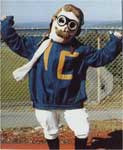 Ithaca College has had its fair share of strange and funny mascots over the years, including a two-person unicorn, Snoopy, and even a rooster. But its most famous (and hilariously inappropriate) mascot has been Bomberman, an explosive-toting mascot with a cape and fighter pilot goggles. In 2011, Ithaca set out to replace the mascot that has grown to be offensive in the post-9/11 world, and came up with several options, none of which were “war-related proposals.” They included a phoenix, flying squirrel, and lake beast, but the school community could not reach a consensus, and in the end, decided not to have a mascot at all.
Ithaca College has had its fair share of strange and funny mascots over the years, including a two-person unicorn, Snoopy, and even a rooster. But its most famous (and hilariously inappropriate) mascot has been Bomberman, an explosive-toting mascot with a cape and fighter pilot goggles. In 2011, Ithaca set out to replace the mascot that has grown to be offensive in the post-9/11 world, and came up with several options, none of which were “war-related proposals.” They included a phoenix, flying squirrel, and lake beast, but the school community could not reach a consensus, and in the end, decided not to have a mascot at all.
4. Colonel Reb
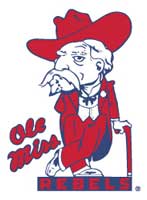 Ithaca College is not alone: the University of Mississippi also had a mascot from the So Bad, It’s Actually Hilarious department. Colonel Reb is the former mascot for the university, a Confederate soldier who looks like a cross between Mark Twain and Colonel Sanders. Students and fans love him, but after years of hearing complaints about the racial insensitivity of having a Confederate soldier for a mascot, the school abandoned the dearly beloved Colonel in 2003. But fans held on, keeping the Colonel alive through 2011, when Ole Miss finally banned the sale of any items with his image. Colonel Reb was replaced by Rebel Black Bear in 2010, beating out Rebel Land Shark and Hotty Toddy. Admiral Ackbar was also briefly proposed as a candidate. The decision to change from Reb to Black Bear has been controversial, however, and many are still fighting the change.
Ithaca College is not alone: the University of Mississippi also had a mascot from the So Bad, It’s Actually Hilarious department. Colonel Reb is the former mascot for the university, a Confederate soldier who looks like a cross between Mark Twain and Colonel Sanders. Students and fans love him, but after years of hearing complaints about the racial insensitivity of having a Confederate soldier for a mascot, the school abandoned the dearly beloved Colonel in 2003. But fans held on, keeping the Colonel alive through 2011, when Ole Miss finally banned the sale of any items with his image. Colonel Reb was replaced by Rebel Black Bear in 2010, beating out Rebel Land Shark and Hotty Toddy. Admiral Ackbar was also briefly proposed as a candidate. The decision to change from Reb to Black Bear has been controversial, however, and many are still fighting the change.
5. University of Southern Mississippi’s General Nat
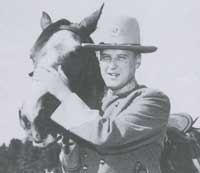 For many years, the University of Southern Mississippi was represented as the “Southerners,” with General Nat as their mascot. But like Colonel Reb, General Nat turned out to be oh-so-comically wrong, as he represented a real life Confederate general who also happened to be the founder of the Ku Klux Klan, General Nathaniel Bedford Forrest. In 1972, the school came together to choose a new name, and the university is now represented as the Golden Eagles with a mascot named Seymour.
For many years, the University of Southern Mississippi was represented as the “Southerners,” with General Nat as their mascot. But like Colonel Reb, General Nat turned out to be oh-so-comically wrong, as he represented a real life Confederate general who also happened to be the founder of the Ku Klux Klan, General Nathaniel Bedford Forrest. In 1972, the school came together to choose a new name, and the university is now represented as the Golden Eagles with a mascot named Seymour.
6. Slippery Rock University Rocks
 Slippery Rock University still identifies itself as The Rock, but its mascot has gone through a few different iterations. Before adopting Rocky the Lion as the new mascot, the school had what has been described as a “rock looking thing” that students hated because it looked like a “wet gym sock.” The sock/rock was kidnapped, and it seems that no one went looking for it.
Slippery Rock University still identifies itself as The Rock, but its mascot has gone through a few different iterations. Before adopting Rocky the Lion as the new mascot, the school had what has been described as a “rock looking thing” that students hated because it looked like a “wet gym sock.” The sock/rock was kidnapped, and it seems that no one went looking for it.
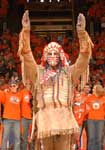 The University of Illinois at Urbana-Champaign used Chief Illiniwek as its mascot and official symbol of the university from 1926 to 2007, when the character was retired due to extreme controversy. The Chief was originally introduced to the university to pay homage to the Illiniwek people of Illinois, but it seems that it was pretty insulting: many Illiniwek were actually forced from their homes as non-Indians claimed the territory. So once again, this mascot’s story is pretty funny, but only if you have a sick sense of humor like we do. They are, of course, not the only school to have a Native American mascot, but unlike Florida State, whose Seminole nickname and mascot is actually costumed and approved by Seminole Nation, the Native Americans formerly of Illinois do not particularly like Chief Illiniwek. The University of Illinois finally quit using this incredibly offensive mascot when other teams refused to allow the school to bring Chief Illiniwek to games, and the NCAA banned them from hosting postseason games as long as he was still in use.
The University of Illinois at Urbana-Champaign used Chief Illiniwek as its mascot and official symbol of the university from 1926 to 2007, when the character was retired due to extreme controversy. The Chief was originally introduced to the university to pay homage to the Illiniwek people of Illinois, but it seems that it was pretty insulting: many Illiniwek were actually forced from their homes as non-Indians claimed the territory. So once again, this mascot’s story is pretty funny, but only if you have a sick sense of humor like we do. They are, of course, not the only school to have a Native American mascot, but unlike Florida State, whose Seminole nickname and mascot is actually costumed and approved by Seminole Nation, the Native Americans formerly of Illinois do not particularly like Chief Illiniwek. The University of Illinois finally quit using this incredibly offensive mascot when other teams refused to allow the school to bring Chief Illiniwek to games, and the NCAA banned them from hosting postseason games as long as he was still in use.
8. Bradford College Fighting Squirrels
 Bradford College closed its doors in 2000 after 197 years of existence, changing from the original Bradford Academy to Bradford Junior College, and finally resting on Bradford College. But throughout all of its name changes, the school kept one thing the same: its mascot. Amazingly, the “Fighting Squirrels” mascot was still representing the school all the way until the end. And even though the college has closed its doors, the mascot has lived on as a cult following. Apparel outlets have caught on to this following, and fans of the “Fighting Squirrels” can still order team hats, shirts, and more online.
Bradford College closed its doors in 2000 after 197 years of existence, changing from the original Bradford Academy to Bradford Junior College, and finally resting on Bradford College. But throughout all of its name changes, the school kept one thing the same: its mascot. Amazingly, the “Fighting Squirrels” mascot was still representing the school all the way until the end. And even though the college has closed its doors, the mascot has lived on as a cult following. Apparel outlets have caught on to this following, and fans of the “Fighting Squirrels” can still order team hats, shirts, and more online.
9. Cedar Crest College Classics
 Until 2001, Cedar Crest College students in Allentown, Pa.,went as the “Classics,” but changed it because, really who knows what a “classic” actually is? They have since changed their mascot to the “Falcons” and are much more easily identified.
Until 2001, Cedar Crest College students in Allentown, Pa.,went as the “Classics,” but changed it because, really who knows what a “classic” actually is? They have since changed their mascot to the “Falcons” and are much more easily identified.
10. University of Hawaii Rainbow Warriors
 Before 2000, all of Hawaii’s sports teams were represented as the “Rainbow Warriors,” featuring, predictably, a rainbow. But some of the athletes expressed that they didn’t enjoy being represented by a nickname that is most commonly associated with the gay community. It was a controversial decision, the school revamped its representation, changing the names of its teams to include the “Warriors,” “Rainbows,” and some teams who still go by the “Rainbow Warriors.” The “Warriors” are now represented by a self-appointed mascot, Vili, who dresses as a fierce polynesian warrior, but steers clear of the rainbow, instead donning black, green, and white.
Before 2000, all of Hawaii’s sports teams were represented as the “Rainbow Warriors,” featuring, predictably, a rainbow. But some of the athletes expressed that they didn’t enjoy being represented by a nickname that is most commonly associated with the gay community. It was a controversial decision, the school revamped its representation, changing the names of its teams to include the “Warriors,” “Rainbows,” and some teams who still go by the “Rainbow Warriors.” The “Warriors” are now represented by a self-appointed mascot, Vili, who dresses as a fierce polynesian warrior, but steers clear of the rainbow, instead donning black, green, and white.
11. St. Bonaventure University Squaws
 Before 1979, St. Bonaventure men’s teams went as the amazingly offensive Brown Indians, but the mascot that really cracks us up is the “Brown Squaws” mascot used to represent the university’s female teams. A former female athlete explains that the school stopped using the Squaw name when a Seneca chief came to the university to explain that the name actually meant “vagina.” The teams are now known as the “Bonnies.”
Before 1979, St. Bonaventure men’s teams went as the amazingly offensive Brown Indians, but the mascot that really cracks us up is the “Brown Squaws” mascot used to represent the university’s female teams. A former female athlete explains that the school stopped using the Squaw name when a Seneca chief came to the university to explain that the name actually meant “vagina.” The teams are now known as the “Bonnies.”
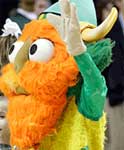 From 1986 to 1997, Wright State’s sports teams were represented by the Rowdy Raider, a red-bearded Viking mascot adorned by a horned helmet. The mascot was quite odd looking, with wooly faux-fur boots, and a face made up nearly entirely of fur, save for two comically large eyes popping out and a misshapen nose. We would not be surprised to find out that the Rowdy Raider had been mistaken for a deranged Muppet. The school has now adopted a more friendly and easy-to-identify wolf as its Raider mascot.
From 1986 to 1997, Wright State’s sports teams were represented by the Rowdy Raider, a red-bearded Viking mascot adorned by a horned helmet. The mascot was quite odd looking, with wooly faux-fur boots, and a face made up nearly entirely of fur, save for two comically large eyes popping out and a misshapen nose. We would not be surprised to find out that the Rowdy Raider had been mistaken for a deranged Muppet. The school has now adopted a more friendly and easy-to-identify wolf as its Raider mascot.
13. Florida Technological University Citronauts
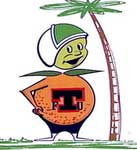 Before the University of Central Florida became the Knights, they were the Florida Technological University Citronauts. What exactly is a Citronaut? It turns out that it’s a mix of an orange and an astronaut, but photos of the mascot make it look like a small green spaceman with an orange for a body, a strange creature for sure.
Before the University of Central Florida became the Knights, they were the Florida Technological University Citronauts. What exactly is a Citronaut? It turns out that it’s a mix of an orange and an astronaut, but photos of the mascot make it look like a small green spaceman with an orange for a body, a strange creature for sure.
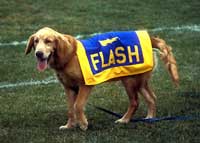 Kent State used to be known as the Silver Foxes, a name that was probably quite fitting at the time, but now calls to mind images of Anderson Cooper and other attractive older men. But fortunately for Kent State, they changed their mascot before it became known as the male version of a cougar. In 1923, Kent State held a contest, offering a $25 prize for the winner with a new nickname. It was at this time that KSU became the Golden Flashes, a name that has been portrayed with mascots including a golden retriever and a live eagle.
Kent State used to be known as the Silver Foxes, a name that was probably quite fitting at the time, but now calls to mind images of Anderson Cooper and other attractive older men. But fortunately for Kent State, they changed their mascot before it became known as the male version of a cougar. In 1923, Kent State held a contest, offering a $25 prize for the winner with a new nickname. It was at this time that KSU became the Golden Flashes, a name that has been portrayed with mascots including a golden retriever and a live eagle.
15. Bugeaters
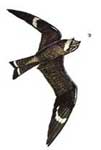 Before the University of Nebraska became the Cornhuskers, they had quite interesting mascots and nicknames, including Mankilling Mastadons and the Mighty Bugeaters. The Bugeater mascot stemmed from Nebraska’s reputation as the “Bug-eating State,” referencing the state’s bull bats that eat insects, and are thus called “bug-eaters.” Nebraska only adopted the Cornhusker name when sportswriter Charles Sherman gave them the suggestion, apparently beating out old names of “Tree Planters” “Rattlesnake Boys,” and even “Antelopes.”
Before the University of Nebraska became the Cornhuskers, they had quite interesting mascots and nicknames, including Mankilling Mastadons and the Mighty Bugeaters. The Bugeater mascot stemmed from Nebraska’s reputation as the “Bug-eating State,” referencing the state’s bull bats that eat insects, and are thus called “bug-eaters.” Nebraska only adopted the Cornhusker name when sportswriter Charles Sherman gave them the suggestion, apparently beating out old names of “Tree Planters” “Rattlesnake Boys,” and even “Antelopes.”
Provided by: http://www.onlinecollege.org/



